270 start with A start with A
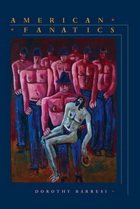
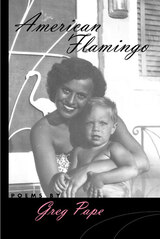
Taking its title from an Audubon painting, American Flamingo shares with the artist an exquisite attention to detail and the suggestion of a larger sense of time and place through depictions of the intimate interactions between creatures and their habitats. In his fifth collection of poetry, Greg Pape melds memorable images from the natural world with the drama of ordinary experience to capture small transformations of human character in American settings from Arizona’s Sonora Desert to the icy streets of Washington, D.C. Through elegies, character sketches, and lyric and narrative evocations of family and place, Pape offers lucid and startling poems that bridge the spaces between the past and the present, men and women, and urban and rural landscapes.
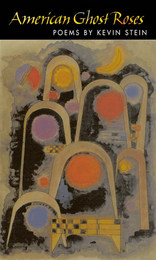
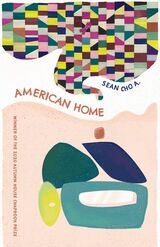
Sean Cho A.’s debut poetry chapbook directs a keen eye on everyday occurrences and how these small events shape us as individuals. This collection is filled with longing for love, understanding, and simplicity. But these poems also express great pleasure in continued desire. With exuberant energy that flows through the collection, the speaker announces: “I won’t apologize for the smallness of my delights.” Filled with questions and wonder, these poems revel in the unknowing and liminal spaces, and we as readers are invited to join in this revelry. Cho A.’s poetry reminds and allows us to pause, to wonder, and enjoy our many pleasures.
American Home was selected by Danusha Laméris for the 2020 Autumn House Chapbook Prize.


The massif’s landscapes are as varied as pinewoods, clay hills and prairie, but grow more abstract. In his naive way, A.M. moves through or ponders the Higgs Field, art, national and family states of emergency. From his own house to an airport, from volcano to museum, he goes foraging for images good enough to eat, for friends, for antidotes to apocalypse.
Perhaps no more human by the end, A.M. still bears his “girth and melancholy,” though having shed some of the illusions, like vestiges, with which he started. Dazed as much as sobered, he feels himself released into the world like a new habitat—however threatened. Rather, like the Pompeian who returns to her city, the Mastodon comes into his own.
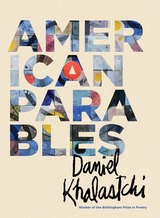
Through unnerving gallows humor and radical honesty, these poems redefine the American experience by asking the reader to consider what it means to live in the shadow of a perceived sense of freedom and to have faith when believing feels hopeless. Khalastchi's perspective as an Iraqi Jewish American brings sharp focus to the holistic uncertainties of religion, politics, assimilation, illness, love, and loss—with absurd, visceral, and wry acclaim.
the internet your high school
has the flu. We are sick
everyone is fine.
—Excerpt from "First Generation: Our Escape"
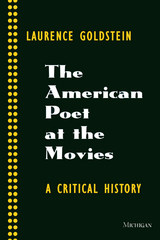
As an increasingly popular genre of modern poetry, and one that permits a unique view of this century's dominant art form, the movie poem has needed an explanatory book like this one. As cinema and television continue to wield extraordinary influence over the lives of all Americans, the efforts of poets to understand the visual culture will come to be appreciated as central to the task of modern and postmodern literature. This critical history is an important and timely contribution to the study of American literature and American institutions.
"One of the impressive things about the book is that while pursuing the seemingly narrow category of poems-about-movies, Goldstein is able to raise and illuminate virtually all the key issues surrounding the poetry of the period." - Roger Gilbert, Cornell University
". . . a discerning book, combining criticism and social history. It satisfies scholarly standards while appealing to general readers." - Philip French, coeditor of the Faber Book of Movie Verse
"In this work, [Goldstein] provides a new way of looking at American poets, both familiar and neglected. The approach is chronological and thematic, and films are seen from black, gay, Jewish, and feminist as well as middle-class white perspectives." Library Journal
Laurence Goldstein is editor of the Michigan Quarterly Review and Professor of English, University of Michigan.
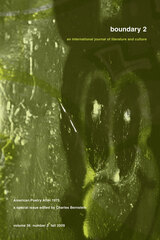
Writing from the forefront of American poetry criticism, contributors to this special issue address topics such as the poetics of disability and the work of clairvoyant poet Hannah Weiner, ambience and the work of Tan Lin, the continuing influence of Wallace Stevens, and the use of found text in Susan Howe’s “The Midnight.” Two younger critics address their generation’s poetics, one by considering the social relevance of the lyric and the other by examining resistance to innovative poetry practice. The intersection of poetry and technology is explored in articles about digital spaces and radical poetry’s relationship with the digital archive. One contributor applies the work of philosopher J. L. Austin to the language of hip-hop and the work of rapper Rakim. Also included are four short poems, a panegyric for the poetics of sophism in critical discourse, and essays that address the aesthetics of sentimental poetry and the poetics of place.

Challenging the common perception of poets as standing apart from the mainstream of American culture, Robert von Hallberg gives us a fresh and unpredictable assessment of the poetry that has come directly out of the American experience since 1945.
Who reads contemporary American poetry? More people than were reading new poetry in the 1920s, von Hallberg shows. How do poets respond to the public preoccupations of their readers? Often with fascination. Von Hallberg put the poems of Robert Creeley and John Ashbery together with the postwar outburst of systems analysis. The 1950s tourist poems of John Hollander, Adrienne Rich, W. S. Merwin, and James Merrill are treated as the cultural side of America’s postwar rise to global political power There are chapters on the political poems of the 1950s and 1960s, and on Robert Lowell’s sympathy for the imperialism of his liberal contemporaries. Poems of the 1970s on pop culture, especially Edward Dorn’s Slinger, and some from the suburbs of the 1980s, are shown to reflect a curious peace between the literary and the mass cultures.
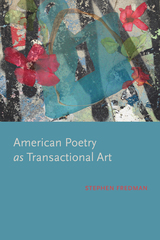
Many people think of poetry as a hermetic art, as though poets wrote only about themselves or as if the subject of poetry were finally only poetry—its forms and traditions. Indeed much of what constitutes poetry in the lyric tradition depends on a stringently controlled point of view and aims for a timeless, intransitive utterance. Stephen Fredman’s study proposes a different perspective.
American Poetry as Transactional Art explores a salient quality of much avant-garde American poetry that has so far lacked sustained treatment: namely, its role as a transactional art. Specifically Fredman describes this role as the ways it consistently engages in conversation, talk, correspondence, going beyond the scope of its own subjects and forms—its existential interactions with the outside world. Poetry operating in this vein draws together images, ideas, practices, rituals, and verbal techniques from around the globe, and across time—not to equate them, but to establish dialogue, to invite as many guests as possible to the World Party, which Robert Duncan has called the “symposium of the whole.”
Fredman invites new readers into contemporary poetry by providing lucid and nuanced analyses of specific poems and specific interchanges between poets and their surroundings. He explores such topics as poetry’s transactions with spiritual traditions and practices over the course of the twentieth century; the impact of World War II on the poetry of Charles Olson and George Oppen; exchanges between poetry and other art forms including sculpture, performance art, and ambient music; the battle between poetry and prose in the early work of Paul Auster and in Lyn Hejinian’s My Life. The epilogue looks briefly at another crucial transactional occasion: teaching American poetry in the classroom in a way that demonstrates that it is at the center of the arts and at the heart of American culture.
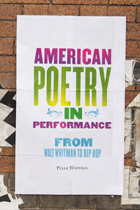
"Tyler Hoffman brings a fresh perspective to the subject of performance poetry, and this comes at an excellent time, when there is such a vast interest across the country and around the world in the performance of poetry. He makes important connections, explaining things in a manner that remains provocative, interesting, and accessible."
---Jay Parini, Middlebury College
American Poetry in Performance: From Walt Whitman to Hip Hop is the first book to trace a comprehensive history of performance poetry in America, covering 150 years of literary history from Walt Whitman through the rap-meets-poetry scene. It reveals how the performance of poetry is bound up with the performance of identity and nationality in the modern period and carries its own shifting cultural politics. This book stands at the crossroads of the humanities and the social sciences; it is a book of literary and cultural criticism that deals squarely with issues of "performance," a concept that has attained great importance in the disciplines of anthropology and sociology and has generated its own distinct field of performance studies. American Poetry in Performance will be a meaningful contribution both to the field of American poetry studies and to the fields of cultural and performance studies, as it focuses on poetry that refuses the status of fixed aesthetic object and, in its variability, performs versions of race, class, gender, and sexuality both on and off the page.
Relating the performance of poetry to shifting political and cultural ideologies in the United States, Hoffman argues that the vocal aspect of public poetry possesses (or has been imagined to possess) the ability to help construct both national and subaltern communities. American Poetry in Performance explores public poets' confrontations with emergent sound recording and communications technologies as those confrontations shape their mythologies of the spoken word and their corresponding notions about America and Americanness.
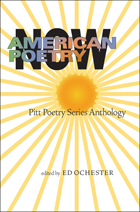
American Poetry Now is a comprehensive collection of the best work from the renowned Pitt Poetry Series. Since its inception in 1967, the series has been a vehicle for America's finest contemporary poets. The series list includes Poet Laureate Billy Collins, Toi Derricotte, Denise Duhamel, Lynn Emanuel, Bob Hicok, Poet Laureate and Pulitzer Prize winner Ted Kooser, Larry Levis, Sharon Olds, Alicia Suskin Ostriker, Virgil Suárez, Afaa Michael Weaver, David Wojahn, Dean Young, and many others.
Throughout its forty-year history, the Pitt Poetry Series has provided a voice for the diversity that is American poetry, representing poets from many backgrounds without allegiance to any one school or style. American Poetry Now is a true representation of contemporary American poetry.
Ed Ochester, series editor for nearly thirty years, has assembled a quintessential selection-along with biographies and photos, an enlightening introduction, and a suggested list for further reading, all in a highly accessible format. American Poetry Now is a sweeping anthology that will delight poetry fans, students, teachers, and general readers alike.
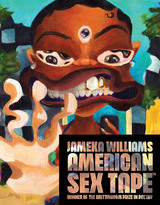
Fiercely feminist, Black, American, and powerful, Williams speaks for a generation of obsessive social media influencers and consumers, revealing the complex ways in which we are all actors, witnesses, and victims in our public and private performances. Though we may be permanent residents of this soulless cultural landscape, this stunning collection refuses to let it define us.
off the conveyor belt, hugging the bolts & wires
spilling from her vivisection. I’m last year’s model
with a sleeker, softer system of cool disdain for
my Internet addictions.
—Excerpt from "I Intend to Outlast"
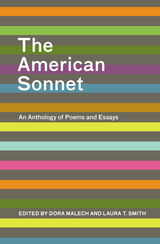
Contributor List: Essayists
Abdul Ali, Baltimore, MD
Anna Lena Phillips Bell, University of North Carolina, Wilmington
Jodie Childers, Queens, New York
Benjamin Crawford, University of Alabama
Meg Day, Franklin and Marshall College
Donna Denizé, St. Albans School
Michael Dumanis, Bennington College
Jordan Finkin, Hebrew Union College
Rebecca Morgan Frank, Northwestern University
Anna Maria Hong, Mount Holyoke College
Gillian Huang-Tiller, University of Virginia, Wise
Walt Hunter, Clemson University
John James, University of California, Berkeley
Matthew Kilbane, University of Notre Dame
Diana Leca, University of Oxford
Ariel Martino, Colgate University
Nate Mickelson, New York University
Lisa L. Moore, University of Texas at Austin
Timo Müller, University of Konstanz, Germany
Carl Phillips, Washington University in St. Louis
Zoë Pollak, Columbia University
Jonathan F.S. Post, UCLA
Stephen Regan, Durham University, UK
Jahan Ramazani, University of Virginia
Hollis Robbins, University of Utah
Nathan Spoon, Joelton, TN
Marlo Starr, Wittenberg University
Yuki Tanaka, Hosei University, Japan
Tess Taylor, Ashland University
Michael Theune, Illinois Wesleyan University
Eleanor Wakefield, University of Oregon
Lesley Wheeler, Washington and Lee University
Jon Woodson, Howard University emeritus
Contributors List: Poets
Elizabeth Alexander, Agha Shahid Ali, Julia Alvarez, Maggie Anderson, Tacey Atsitty, Charles Bernstein, Ted Berrigan, Jen Bervin, Elizabeth Bishop, Louise Bogan, Ruth Muskrat Bronson, Gwendolyn Brooks, Jericho Brown, Lucille Clifton, Henri Cole, Wanda Coleman, Countee Cullen, William Cullen Bryant, E.E. Cummings, Meg Day, Natalie Diaz, Paul Laurence Dunbar, Alice Moore Dunbar-Nelson, Ralph Waldo Emerson, Rhina Espaillat, Tarfia Faizullah, Robert Frost, torrin a. greathouse, Marilyn Hacker, Robert Hayden, Terrance Hayes, Anthony Hecht, Lynn Hejinian, Leslie Pinckney Hill, Anna Maria Hong, Langston Hughes, David Humphreys, Helen Hunt Jackson, Tyehimba Jess, Helene Johnson, James Weldon Johnson, June Jordan, Douglas Kearney, Richard Kenney, Joan Larkin, Emma Lazarus, Mani Levb, Amy Lowell, Robert Lowell, Nate Marshall, Bernadette Mayer, George Marion McClellan, Brandy Nalani McDougall, Claude McKay, Joyelle McSweeney, Lo Kwa Mei-en, James Merrill, Phillip Metres, Edna St. Vincent Millay, Simone Muench, Marilyn Nelson, Craig Santos Perez, Carl Phillips, Sylvia Plath, Alexander Posey, Lizette Woodworth Reese, Adrienne Rich, Lola Ridge, Muriel Rukeyeser, Kay Ryan, Diane Seuss, Fradel Shtok, Aaron Shurin, giovanni singleton, Patricia Smith, Mary Ellen Solt, Nathan Spoon, Gertrude Stein, Adrienne Su, Lorenzo Thomas, Dunstan Thompson, Natasha Tretheway, Fredrick Goddard Tuckerman, Mona Van Duyn, Ellen Bryant Voight, Margaret Walker, Lucian B. Watkins, Phillis Wheatley, John Wheelwright, Jackie K. White, Walt Whitman, James Wright, Elinor Wylie
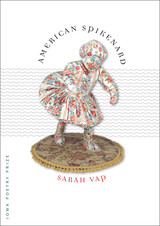
“If everyone decided to call themselves a girl / that word would stop.” In this award-winning volume of authoritative and assertive poems, Sarah Vap embarks on an emotional journey to the land of America’s female children. Questioning, contradicting, radically and restlessly demanding acceptance, she searches for a way to move from serious girlhood to womanly love. Demonstrating the seriousness of female childhood—which is as dangerous and profound as war, economics, and history, that is, as manhood, in her view—Vap reveals the extremes of self-doubt and self-righteousness inherent in being a contemporary American girl.
“When we’re overcome / by everything we think we love—then by morning / we’re adults.” Just as the oil of American spikenard may provide relief from childhood, so does Sarah Vap provide the kind of holy and extravagant love and honor that can relieve the growing pains of “everyone’s little girl.”
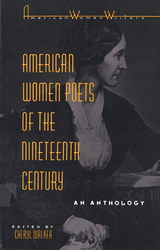
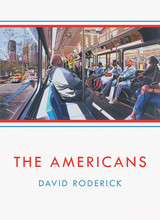
Winner of the 2014 Julie Suk Award for the best poetry book published by an independent press.
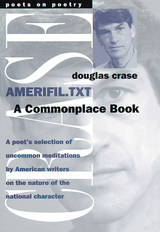
The twenty-three American writers who appear in the book range chronologically from the colonial thinker John Wise to the contemporary poet John Ashbery. Their appearances are arranged to comment almost interactively on identifiable American issues like "Doing Your Thing," "How Writing Is Written," "Pursuit of Happiness," and "Right to Privacy." Douglas Crase has said that he finds rearrangement morally and artistically more interesting than opinions, as rearrangement involves choice and commitment, while opinions are only held. In the end, readers may conclude that Amerifil.Txt is not a commonplace book at all, but rather a spiritual autobiography of its compiler.
Douglas Crase is a widely anthologized poet, essayist, and critic. His acclaimed volume of poetry The Revisionist earned nominations for the National Book Critics Circle Award and the American Book Award in poetry. He has received an Ingram-Merrill Award, a Whiting Writer's Award, and fellowships from the MacArthur and Guggenheim foundations and the American Academy and Institute of Arts and Letters.
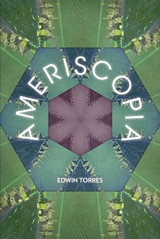
Ameriscopia reimagines New York City and its expansive inspirations, which for Torres capture the contradictions of America. Allusions to the Twin Towers, Coney Island hot dogs, and the Nuyorican Poet’s Cafe continuously recolor the pages. But even as he makes these iconic references, Torres allows his poems to invert and refract the identities they evoke—New-Yorker-American-Latino-Dad-Performer-Boy-Writer—to invigorate poetry out of its slumber into a deep cultural urgency. Torres’s kaleidoscopic vision is borne of decades of poetic experimentation. Audiences have delighted in his spontaneous mashups of disparate topic matters; writers have studied his skilled technique at synthesizing—for example, from a mundane curbside view to an imagined conversation with artists Marcel Duchamp and Yves Tanguy.
Torres writes, “I discovered that, this world uncovered / is like the soul / of The Puerto Rican man — occupied / by the weight of his balance.” Ameriscopia is Torres’s statement on growing up and the inspirational facets that accompany his journey into fatherhood. From conversations in cars to fast-beat lullabies, Torres’s poetry taps into rhythms both distinctive and dynamic. In Ameriscopia Torres is at full force, a poet in control, a writer emboldened by the page—in flight.
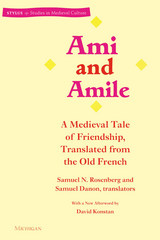
The compelling translation by Samuel N. Rosenberg and Samuel Danon is accompanied by an introduction on the background, genre, and general sense of the tale. The volume also includes an afterword by David Konstan, which examines the medieval work's concept of friendship within a perspective extending back to classical antiquity.
This translation will reveal Ami and Amile as a major work of the French Middle Ages. In elegant and forceful prose, it weaves together the themes of friendship and love and the status of women, of sin and punishment, the moral problem of doing wrong for the right reason, and the mythic affliction of leprosy. The work will foster lively literary and philosophical discussion.
Ami and Amile is of interest to a wide range of readers, including students of history, comparative literature, and gender studies. Medievalists will find it a welcome addition to their libraries and a captivating experience for their students.
The volume is published in the series Stylus: Studies in Medieval Culture, edited by Eugene Vance, University of Washington. Samuel N. Rosenberg is Professor of French and Italian at Indiana University; Samuel Danon is Professor of French at Reed College.
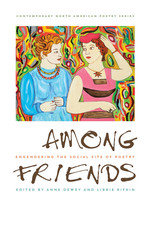
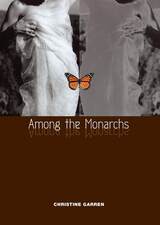
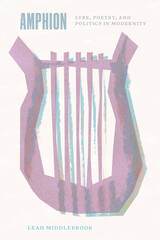
Amphion is the figure in Greek mythology who played so skillfully on a lyre that stones moved of their own accord to build walls for Thebes. While Amphion still presides over music and architecture, he was once fundamental to the concept of lyric poetry. Amphion figured the human power to inspire action, creating and undoing polities by means of language. In contrast to the individual inspiration we associate with the better-known Orpheus, Amphion represents the relentless, often violent, play of order and disorder in human social life. His lyre was a powerful metaphor in the age of European imperial expansion.
In this wide-ranging study, Leah Middlebrook introduces readers to Amphion-inspired poetics and lyrics and traces the tradition of the Amphionic from the Renaissance through modernist and postmodern poetry and translation from the Hispanic, Anglophone, French, Italian, and ancient Roman worlds. Amphion makes a significant contribution to scholarship on the connection between poetry and politics and the history of the lyric, offering an account well-suited to our times.
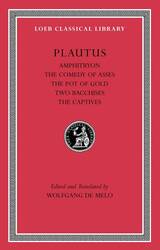
Funny happenings.
The rollicking comedies of Plautus, who brilliantly adapted Greek plays for Roman audiences ca. 205–184 BC, are the earliest Latin works to survive complete and are cornerstones of the European theatrical tradition from Shakespeare and Molière to modern times. This first volume of a new Loeb edition of all twenty-one of Plautus’ extant comedies presents Amphitruo, Asinaria, Aulularia, Bacchides, and Captivi with freshly edited texts, lively modern translations, and ample explanatory notes. Accompanying the plays is a detailed introduction to Plautus’ œuvre as a whole, discussing his techniques of translation and adaptation, his use of Roman humor, stage conventions, language and meter, and his impact on the Greco-Roman comedic theater and beyond.
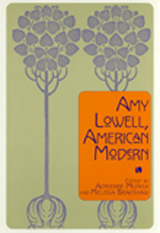
For decades, the work of one of America’s most influential poets, 1925 Pulitzer Prize–winner Amy Lowell (1874–1925), has been largely overlooked. This vigorous, courageous poet gave voice to an erotic, thoroughly American sensibility. Cigar-smoker, Boston Brahmin, lesbian, impresario, entrepreneur, and prolific poet, Lowell heralded the rush of an American poetic flowering. A best-selling poet as well as a wildly popular lecturer (autograph-seeking fans were sometimes so boisterous that she required a police escort), she was a respected authority on modern poetry, forging the path that led to the works of Allen Ginsberg, May Sarton, Sylvia Plath, and beyond. Yet, since her death, her work has suffered critical neglect.
This volume presents an essential revaluation of Lowell, and builds a solid critical basis for evaluating her poetry, criticism, politics, and influence. Essays explore the varied contributions of Lowell as a woman poet, a modernist, and a significant force of the literary debates of early twentieth-century poetics. In addition to placing Lowell in her proper historical context, contributors demonstrate her centrality to current critical and theoretical discussions: feminist, gay and lesbian, and postcolonial, in as well as in disability, American, and cultural studies. The book includes a transatlantic group of literary critics and scholars.
Amy Lowell, American Modern offers the most sustained examination of Lowell to date. It returns her to conversation and to literary history where she belongs.
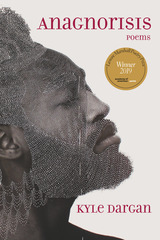
In Anagnorisis: Poems, the award-winning poet Kyle Dargan ignites a reckoning. From the depths of his rapidly changing home of Washington, D.C., the poet is both enthralled and provoked, having witnessed-on a digital loop running in the background of Barack Obama's unlikely presidency—the rampant state-sanctioned murder of fellow African Americans. He is pushed toward the same recognition articulated by James Baldwin decades earlier: that an African American may never be considered an equal in citizenship or humanity.
This recognition—the moment at which a tragic hero realizes the true nature of his own character, condition, or relationship with an antagonistic entity—is what Aristotle called anagnorisis. Not concerned with placatory gratitude nor with coddling the sensibilities of the country's racial majority, Dargan challenges America: "You, friends- / you peckish for a peek / at my cloistered, incandescent / revelry-were you as earnest / about my frostbite, my burns, / I would have opened / these hands, sated you all."
At a time when U.S. politics are heavily invested in the purported vulnerability of working-class and rural white Americans, these poems allow readers to examine themselves and the nation through the eyes of those who have been burned for centuries.
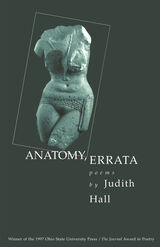
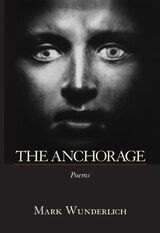
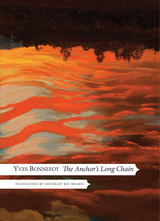
Yves Bonnefoy has wowed the literary world for decades with his diffuse volumes. First published in France in 2008, The Anchor’s Long Chain is an indispensable addition to his oeuvre. Enriching Bonnefoy’s earlier work, the volume, translated by Beverley Bie Brahic, also innovates, including an unprecedented sequence of nineteen sonnets. These sonnets combine the strictness of the form with the freedom to vary line length and create evocative fragments. Compressed, emotionally powerful, and allusive, the poems are also autobiographical—but only in glimpses. Throughout, Bonnefoy conjures up life’s eternal questions with each new poem.
Longer, discursive pieces, including the title poem’s meditation on a prehistoric stone circle and a legend about a ship, are also part of this volume, as are a number of poetic prose pieces in which Bonnefoy, like several of his great French predecessors, excels. Long-time fans will find much to praise here, while newer readers will quickly find themselves under the spell of Bonnefoy’s powerful, discursive poetry.

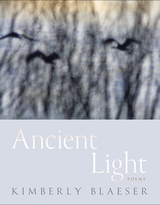
With vision and resilience, Kimberly Blaeser’s poetry layers together past, present, and futures. Against a backdrop of pandemic loss and injustice, MMIW (Missing and Murdered Indigenous Women), hidden graves at Native American boarding schools, and destructive environmental practices, Blaeser’s innovative poems trace pathways of kinship, healing, and renewal. They celebrate the solace of natural spaces through sense-laden geo-poetry and picto-poems. With an Anishinaabe sensibility, her words and images invoke an ancient belonging and voice the deep relatedness she experiences in her familiar watery regions of Minnesota.
The collection invites readers to see with a new intimacy the worlds they inhabit. Blaeser brings readers to the brink, immerses them in the darkest regions of the Anthropocene, in the dangerous fallacies of capitalism, and then seeds hope. Ultimately, as the poems enact survivance, they reclaim Indigenous stories and lifeways.
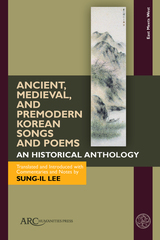
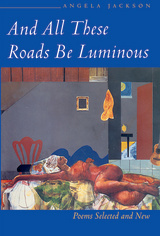
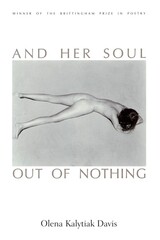
Both contemporary and other-worldly, Davis's lyrical poetry is a fearless expression of the spirit which defines the very essence of our beings.

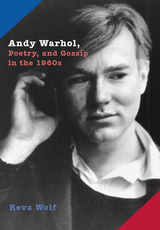
Wolf investigates the underground culture of poets, artists, and filmmakers who interacted with Warhol regularly. She claims that Warhol understood the literary imagination of his generation and that recognizing Warhol's literary activities is essential to understanding his art. Drawing on a wealth of unpublished material, including interviews, personal and public archives, tape recordings, documentary photographs, and works of art, Wolf offers dramatic evidence that Warhol's interactions with writers functioned like an extended conversation and details how this process impacted his work. This highly original and fascinating study gives us fresh insight into Warhol's art as practice and reformulates the myth that surrounds this popular American artist.
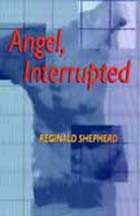
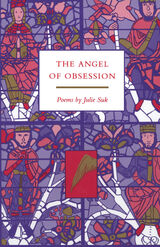
Winner of the 1991 Arkansas Poetry Award, 1992 Roanoke-Chowan Poetry Award, and 1993 Bess Hokin Prize
Others may lament the uncertainties and disappointments of life, but Julie Suk, winner of the second annual Arkansas Poetry Award, embraces its tumult. Turning from the unsullied angels and the paradises captured by generations of artists, these poems focus instead on those who have abandoned heaven for the world of such mundane matters as family, loneliness, love, and loss. Rousing us to the passion and wonder that define our essential humanity, The Angel of Obsession celebrates the full, ragged canvas of living.
Suk’s poetry has previously appeared in The Georgia Review, The Midwest Quarterly, Southern Humanities Review, Poetry, and other important literary magazines. The Angel of Obsession was selected for publication from a field of more than five hundred entries by the poet John Stone.

The seventeen poems gathered in this pocket book, selected by the author, have been brought together as introduction to a body of work spanning thirty years. The poems are rendered in the original Spanish, with English translations on the facing pages.
At the end of the volume there is included a transcript of a question-and-answer session held at Swedenborg House in London in 2011, in which the author discusses his interest in Swedenborg, the inspiration behind his poetry, his groundbreaking environmental activism, and also his key influences.
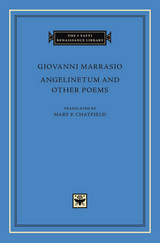
Giovanni Marrasio (d. 1452), a humanist poet from Noto in Sicily, spent the major part of his poetic career in Siena and Ferrara before returning to Palermo in the role of a medical doctor serving the University of Palermo. In Siena, Naples, and Palermo he hovered on the edge of the courts of the Este and of Alfonso “the Magnanimous” of Aragon without ever winning the title of court poet he coveted.
Marrasio was esteemed in the Renaissance as the first to revive the ancient Latin elegy, and his Angelinetum, or “Angelina’s Garden,” as well as his later poems (Carmina Varia) explore that genre in all its variety, from love poetry, to a description of a court masque, to political panegyric, to poetic exchanges with famous humanists of the day such as Leonardo Bruni, Maffeo Vegio, Antonio Panormita, and Enea Silvio Piccolomini. This volume contains the first translation of Marrasio’s works into any modern language.
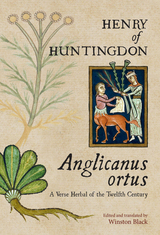
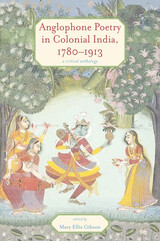
Anglophone Poetry in Colonial India, 1780–1913: A Critical Anthology makes accessible for the first time the entire range of poems written in English on the subcontinent from their beginnings in 1780 to the watershed moment in 1913 when Rabindranath Tagore won the Nobel Prize in Literature.Mary Ellis Gibson establishes accurate texts for such well-known poets as Toru Dutt and the early nineteenth-century poet Kasiprasad Ghosh. The anthology brings together poets who were in fact colleagues, competitors, and influences on each other. The historical scope of the anthology, beginning with the famous Orientalist Sir William Jones and the anonymous “Anna Maria” and ending with Indian poets publishing in fin-de-siècle London, will enable teachers and students to understand what brought Kipling early fame and why at the same time Tagore’s Gitanjali became a global phenomenon. Anglophone Poetry in Colonial India, 1780–1913 puts all parties to the poetic conversation back together and makes their work accessible to American audiences.With accurate and reliable texts, detailed notes on vocabulary, historical and cultural references, and biographical introductions to more than thirty poets, this collection significantly reshapes the understanding of English language literary culture in India. It allows scholars to experience the diversity of poetic forms created in this period and to understand the complex religious, cultural, political, and gendered divides that shaped them.

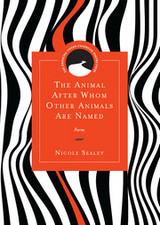
The Poetry and Poetics Colloquium, in conjunction with Northwestern University Press, is delighted to announce that Nicole Sealey is the winner of the fourth annual Drinking Gourd Chapbook Poetry Prize. The Animal After Whom Other Animals Are Named will be published by Northwestern University Press with a planned launch party at the Poetry Foundation in Chicago in January 2016.
At turns humorous and heartbreaking, The Animal After Whom Other Animals Are Named explores in both formal and free verse what it means to die, which is to say, also, what it means to live. In this collection, Sealey displays an exquisite sense of the lyric, as well as an acute political awareness. Never heavy-handed or dogmatic, the poems included in this slim volume excavate the shadows of both personal and collective memory and are, at all points, relentless. To quote the poet herself, here is a debut as luminous and unforgiving "as the unsparing light at tunnel’s end."
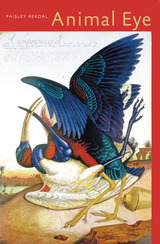
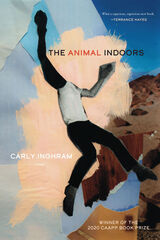
Carly Inghram’s poems explore the day-to-day experiences of a Black queer woman who is ceaselessly bombarded with images of mass-consumerism, white supremacy, and sexism, and who is forced, often reluctantly, back indoors and away from this outside chaos. The poems in The Animal Indoors seek to understand and define the boundaries between our inside and outside lives, critiquing the homogenization and increasing insincerity of American culture and considering what safe spaces exist for Black women. The speaker in these poems seeks refuge, working to keep the interior safe until we can reckon with the world outside, until the speaker is able to “unleash the indoor news onto the unclean water elsewhere.”
The Animal Indoors won the 2020 CAAPP Book Prize, selected by Terrance Hayes.
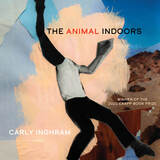
Carly Inghram’s poems explore the day-to-day experiences of a Black queer woman who is ceaselessly bombarded with images of mass-consumerism, white supremacy, and sexism, and who is forced, often reluctantly, back indoors and away from this outside chaos. The poems in The Animal Indoors seek to understand and define the boundaries between our inside and outside lives, critiquing the homogenization and increasing insincerity of American culture and considering what safe spaces exist for Black women. The speaker in these poems seeks refuge, working to keep the interior safe until we can reckon with the world outside, until the speaker is able to “unleash the indoor news onto the unclean water elsewhere.”
The Animal Indoors won the 2020 CAAPP Book Prize, selected by Terrance Hayes.

Lyrically enacting the cognitive dissonance and embodied contradictions of our contemporary age, Hadara Bar-Nadav’s The Animal Is Chemical collects innovative poems that straddle the frontiers of language and scientific knowledge. She brilliantly draws on her own experience as a medical editor and her family’s history of Holocaust survival to write into the hybrid legacy of Western medicine: part clinical empiricism, part human fallibility and moral bankruptcy. Displaying a robust formal range, these poems move from feverish elegies to drug-pamphlet erasures, tangible articulations of Bar-Nadav’s epigenetic, cultural, and memorial inheritance as a writer navigating chronic illness and pain. In these pages, Nazi medical experiments, pharmaceutical literature, and manifestations of intergenerational trauma collide in the lyrical archive of Bar-Nadav’s latest collection, winner of the 2022 Four Way Books Levis Prize in Poetry. Just as she illuminates the paradox of time — that we may think of the past as something gone and yet always present in context and legacy — Bar-Nadav proves the enduring ambivalence of pharmakon, that antidote which poisons us, the medicine that kills. This febrile, fierce book casts spells and confronts illusions, ignites grief and awe, and challenges our assumptions about what it means to heal our bodies, our families, and our shared histories. Perhaps this work fulfills the specious salvation it describes in its opening pages, performing an exorcism of truth-telling that harnesses the heat of a “myth in which a god sets us / on fire and then sets us free.”
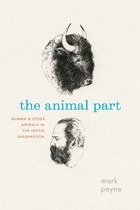
How can literary imagination help us engage with the lives of other animals? The question represents one of the liveliest areas of inquiry in the humanities, and Mark Payne seeks to answer it by exploring the relationship between human beings and other animals in writings from antiquity to the present. Ranging from ancient Greek poets to modernists like Ezra Pound and William Carlos Williams, Payne considers how writers have used verse to communicate the experience of animal suffering, created analogies between human and animal societies, and imagined the kind of knowledge that would be possible if human beings could see themselves as animals see them.
The Animal Part also makes substantial contributions to the emerging discourse of the posthumanities. Payne offers detailed accounts of the tenuousness of the idea of the human in ancient literature and philosophy and then goes on to argue that close reading must remain a central practice of literary study if posthumanism is to articulate its own prehistory. For it is only through fine-grained literary interpretation that we can recover the poetic thinking about animals that has always existed alongside philosophical constructions of the human. In sum, The Animal Part marks a breakthrough in animal studies and offers a significant contribution to comparative poetics.
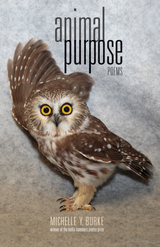
In Animal Purpose, Michelle Y. Burke explores the lives of men and women as they stand poised between the desire to love and the compulsion to harm. In one poem, a woman teaches a farmhand the proper way to slaughter a truckload of chickens. In another, a couple confronts the recent loss of a loved one when a stranger makes an unexpected confession in a crowded restaurant. Set in both rural and urban spaces, these poems challenge received ideas about work, gender, and place. Danger blurs into beauty and back again. Burke scours the hard edges of the world to find “fleeting softness,” which she wishes “into the world like pollen that covers everything.”
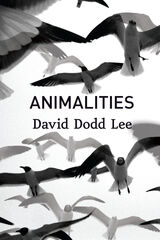
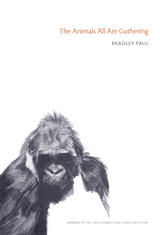
"In this original and wonderfully energetic book, Bradley Paul moves from humor to mockery to play to anger to grief, and sometimes all at once. This poetry shifts, it slams, it hammers, it thinks; it corrodes our sorrow and foolishness; it captures our national haplessness, sad and firing and still."
--Jean Valentine
"This is a book of 'Instructions,' a 'How To' book, a 'Guide' to the anarchic carnival of everyday life. It is a wicked book smelling of 'scrapple' and the 'puke of poetry.' And yet rising out of the bile is something else--call it a love for words and poetry--that can gleefully announce that 'a monkey could write this poem.' Read this book and you will lean 'how to stop your doppelganger from plagiarizing you,' which is exactly what you need to know to live in the twenty-first century." --John Yau
Bradley Paul’s work has appeared in American Poetry Review, Pleiades, Smartish Pace, Boston Review, and other journals. His first book of poetry, The Obvious, was selected by Brenda Hillman for the 2004 New Issues Poetry Prize. A native of Baltimore, he now lives in Los Angeles.
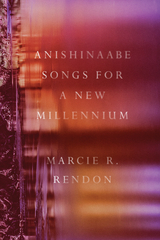
Poem-songs summon the voices of Anishinaabe ancestors and sing to future generations
The ancestors that walk with us, sing us our song. When we get quiet enough, we can hear them sing and make them audible to people today. In Anishinaabe Songs for a New Millennium, Marcie R. Rendon, a member of the White Earth Nation, summons those ancestors’ songs, and so begins the dream singing for generations yet to come. “The Anishinaabe heard stories in their dream songs,” Ojibwe author Gerald Vizenor wrote, and like those stories once inscribed in pictographs on birch-bark scrolls, Rendon’s poem-songs evoke the world still unfolding around us, reflecting our place in time for future generations.
Through dream-songs and poem-songs responding to works of theater, choral music, and opera, Rendon brings memory to life, the senses to attention—to see the moonbeams blossoming on the windowsill, to feel the hold of the earth, to hear the echo of grandmother’s breath, to lie on the bones of ancestors and feel the rhythms of silence running deep. Her singing, breaking the boundaries that time would impose, carries the Anishinaabe way of life and way of seeing forward in the world.
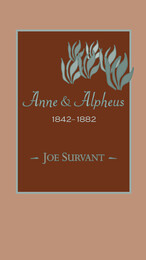
Chosen by Rachel Hadas as the winner of the Arkansas Poetry Award, Anne & Alpheus: 1842–1882 is a compelling duet of monologues between a frontier man and woman surviving the hardships and recording the small triumphs of life in rural nineteenth-century Kentucky.
Ambitious in breadth and scope, these poems chart the loves and losses of early marriage, the terrors of civilian life during the Civil War, and the universal sorrows of aging, loneliness, and death. Through the distinct voices of Anne and Alpheus Waters, Joe Survant has fashioned a collection with all the sweep of a novel, all the dramatic intensity, poem by poem, of short fiction, and all the earthy, human lyricism of the dramatic monologue. These poems take us into the tobacco sheds, put us behind the plow, let us smell the soil, and
carry us under the stars where Anne and Alpheus walked.
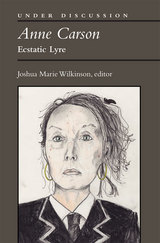
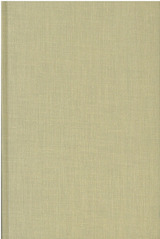
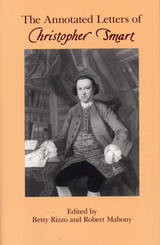
The only collection of all known letters of Christopher Smart provides the best psychological explanation to date of that complex and elusive eighteenth-century poet.
The significant characteristics that distinguish Smart’s prose letters from his poetry, Betty Rizzo and Robert Mahony note, are that his letters were requests for assistance while his verses were bequests, gifts in which he set great store. Indeed, it was Smart’s lifelong conviction that he was a poet of major importance.
As Smart biographer Karina Williamson notes, "The splendidly informative and vivaciously written accounts of the circumstances surrounding each letter, or group of letters, add up to what is in effect a miniature biography."
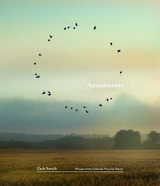
Published by the Center for Literary Publishing at Colorado State University

The narrator of Anon opens the sluice gates of embittered confession and philosophical reproach to release a flood of extravagant lyricism. These poems at first submerge readers in the ecstatic rhythms of its music, then they turn to address the tropes of narrative, inviting readers to join in pursuit of major themes of the human condition.
Steven Seidenberg employs a characteristically aphoristic style to manage multiple lines of inquiry at once. The resultant fragments navigate between testament and treatise, storyline and system, and in a manner that echoes the speculative vehemence of Samuel Beckett, Clarice Lispector, and Maurice Blanchot
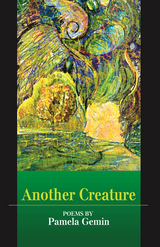
Finalist, Miller Williams Poetry Prize
In Another Creature Pamela Gemin reconciles her generation’s impulse toward personal freedom with its costs as she moves her cast of innocents and outlaws through Midwestern landscapes embroidered with green lawns, blue lakes and raspberry patches eerily wired for sound. Hers are hungry poems, in and of the world, expounding the “flavors and hues, the fragrance and skin / of the merchandise of Earth.”
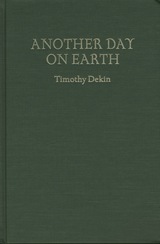

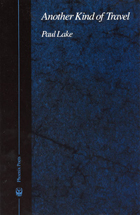
"Lake is not content with simply being precise and original with his descriptions. He possesses another gift of the poetic mind: the ability to make his images, his simple scenes, resonate with meaning."—Wes Ziegler, Arkansas Democrat

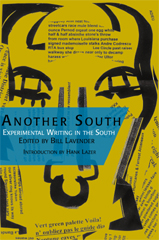
Another South is an anthology of poetry from contemporary southern writers who are working in forms that are radical, innovative, and visionary. Highly experimental and challenging in nature, the poetry in this volume, with its syntactical disjunctions, formal revolutions, and typographic playfulness, represents the direction of a new breed of southern writing that is at once universal in its appeal and regional in its flavor.
Focusing on poets currently residing in the South, the anthology includes both emerging and established voices in the national and international literary world. From the invocations of Andy Young’s “Vodou Headwashing Ceremony” to the blues-informed poems of Lorenzo Thomas and Honorée Jeffers, from the different voicings of John Lowther and Kalamu ya Salaam to the visual, multi-genre art of Jake Berry, David Thomas Roberts, and Bob Grumman, the poetry in Another South is rich in variety and enthusiastic in its explorations of new ways to embody place and time. These writers have made the South lush with a poetic avant-garde all its own, not only redefining southern identity and voice but also offering new models of what is possible universally through the medium of poetry.
Hank Lazer’s introductory essay about “Kudzu textuality” contextualizes the work by these contemporary innovators. Like the uncontrollable runaway vine that entwines the southern landscape, their poems are hyperfertile, stretching their roots and shoots relentlessly, at once destructive and regenerative. In making a radical departure from nostalgic southern literary voices, these poems of polyvocal abundance are closer in spirit to "speaking in tongues" or apocalyptic southern folk art—primitive, astonishing, and mystic.
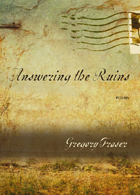
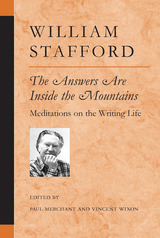
In this fourth collection of reflections on writing and the writing life, the late William Stafford's lifelong refusal to separate his work from the task of living responsibly -- "What a person is shows up in what a person does" -- rings clear.
The Answers Are Inside the Mountains collects unpublished interviews, poems, articles, aphorisms, and writing exercises from this great American man of letters and hugely prolific author, who kept a journal for nearly half a century and produced over 20,000 poems -- a staggering output by any standard.
The book begins with the words "To overwhelm by rightness," a phrase evoking the two demands Stafford made on himself: to write daily, and to live uprightly. The Answers Are Inside the Mountains lives up to those deceptively simple ethics, and confirms William Stafford's enduringly important voice for our uncertain age.
William Stafford (1914-93) authored more than thirty-five books of poetry and prose, including the highly acclaimed Writing the Australian Crawl, You Must Revise Your Life, Crossing Unmarked Snow: Further Views on the Writer's Vocation, and Traveling Through the Dark, winner of the National Book Award for Poetry.
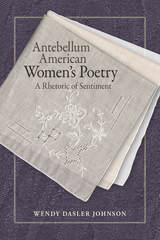
Considering the logos, ethos, and pathos—aims, writing personae, and audience appeal—of poems by African American abolitionist Frances Watkins Harper, working-class prophet Lydia Huntley Sigourney, and feminist socialite Julia Ward Howe, Wendy Dasler Johnson demonstrates that sentimental poetry was an inportant component of antebellum social activism. She articulates the ethos of the poems of Harper, who presents herself as a properly domestic black woman, nevertheless stepping boldly into Northern pulpits to insist slavery be abolished; the poetry of Sigourney, whose speaker is a feisty, working-class, ambiguously gendered prophet; and the works of Howe, who juggles her fame as the reformist “Battle Hymn” lyricist and motherhood of five children with an erotic Continental sentimentalism.
Antebellum American Women's Poetry makes a strong case for restoration of a compelling system of persuasion through poetry usually dismissed from studies of rhetoric. This remarkable book will change the way we think about women’s rhetoric in the nineteenth century, inviting readers to hear and respond to urgent, muffled appeals for justice in our own day.
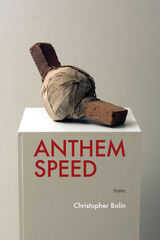
This collection evokes the vividly mysterious remnants of a lost civilization. Its preoccupations are unnervingly familiar: war, injustice, brutalization of land, air, water, and species, technologies of terror and dehumanization. Simultaneously antique and space-age, inhabiting a world of elemental rites and of artificial imaginations, Bolin tests the acoustics of operating rooms, battlefields, courtrooms, and mountainsides, and envisions—with animal acuity—a world imperiled and empowered by its leaders and myths.
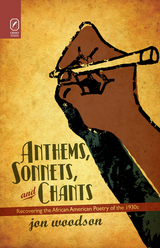

Focusing on the middle generation, with major figures such as Olga Sedakova, Svetlana Kekova, Vera Pavlova, and Tatyana Shcherbina, the collection also includes work by the youngest generation—born after 1970 and not yet known outside of Russia—as well as senior poets such as Bella Akhmadulina and Natalya Gorbanevskaya. Translators include such poets as Elaine Feinstein, Ruth Fainlight, Carol Rumens, and Daniel Weissbort as well as Russianists and scholars Peter France, Catriona Kelly, Robert Reid, and Stephanie Sandler.
A significant and extensive bibliography lists the major works of prominent Russian women poets. A preface by Stephanie Sandler, a concluding note by Dmitry Kuzmin on the online Vavilon project, a postface by Elena Fanailova, and biographical notes on the poets and translators complete the anthology, which is sure to be of great interest to students and scholars of Russian literature.

Never before has there been a single-volume anthology of modern Irish poetry so significant and groundbreaking as An Anthology of Modern Irish Poetry.
Collected here is a comprehensive representation of Irish poetic achievement in the twentieth and twenty-first centuries, from poets such as Austin Clarke and Samuel Beckett who were writing while Yeats and Joyce were still living; to those who came of age in the turbulent ’60s as sectarian violence escalated, including Seamus Heaney and Michael Longley; to a new generation of Irish writers, represented by such diverse, interesting voices as David Wheatley (born 1970) and Sinéad Morrissey (born 1972). Scholar and editor Wes Davis has chosen work by more than fifty leading modern and contemporary Irish poets. Each poet is represented by a generous number of poems (there are nearly 800 poems in the anthology). The editor’s selection includes work by world-renowned poets, including a couple of Nobel Prize winners, as well as work by poets whose careers may be less well known to the general public; by poets writing in English; and by several working in the Irish language (Gaelic selections appear in translation). Accompanying the selections are a general introduction that provides a historical overview, informative short essays on each poet, and helpful notes—all prepared by the editor.

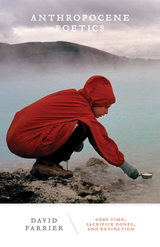
How poetry can help us think about and live in the Anthropocene by reframing our intimate relationship with geological time
The Anthropocene describes how humanity has radically intruded into deep time, the vast timescales that shape the Earth system and all life-forms that it supports. The challenge it poses—how to live in our present moment alongside deep pasts and futures—brings into sharp focus the importance of grasping the nature of our intimate relationship with geological time. In Anthropocene Poetics, David Farrier shows how contemporary poetry by Elizabeth Bishop, Seamus Heaney, Evelyn Reilly, and Christian Bök, among others, provides us with frameworks for thinking about this uncanny sense of time.
Looking at a diverse array of lyric and avant-garde poetry from three interrelated perspectives—the Anthropocene and the “material turn” in environmental philosophy; the Plantationocene and the role of global capitalism in environmental crisis; and the emergence of multispecies ethics and extinction studies—Farrier rethinks the environmental humanities from a literary critical perspective. Anthropocene Poetics puts a concern with deep time at the center, defining a new poetics for thinking through humanity’s role as geological agents, the devastation caused by resource extraction, and the looming extinction crisis.
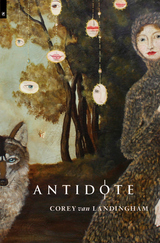

Ancient Athens’ most successful tragedian.
Sophocles (497/6–406 BC), with Aeschylus and Euripides, was one of the three great tragic poets of Athens, and is considered one of the world's greatest poets. The subjects of his plays were drawn from mythology and legend. Each play contains at least one heroic figure, a character whose strength, courage, or intelligence exceeds the human norm—but who also has more than ordinary pride and self-assurance. These qualities combine to lead to a tragic end.
Hugh Lloyd-Jones gives us, in two volumes, a new translation of the seven surviving plays. Volume I contains Oedipus Tyrannus (which tells the famous Oedipus story), Ajax (a heroic tragedy of wounded self-esteem), and Electra (the story of siblings who seek revenge on their mother and her lover for killing their father). Volume II contains Oedipus at Colonus (the climax of the fallen hero's life), Antigone (a conflict between public authority and an individual woman's conscience), The Women of Trachis (a fatal attempt by Heracles' wife to regain her husband's love), and Philoctetes (Odysseus' intrigue to bring an unwilling hero to the Trojan War).
Of his other plays, only fragments remain; but from these much can be learned about Sophocles' language and dramatic art. The major fragments—ranging in length from two lines to a very substantial portion of the satyr play The Searchers—are collected in Volume III of this edition. In prefatory notes Lloyd-Jones provides frameworks for the fragments of known plays.

The extraordinary actor–director–writer who developed his talent for self-torture into art to become one of the most vital creative forces of the century.

Regarded by many as the finest poet of twentieth-century Spain, Antonio Machado y Ruiz (1875–1939) is not well known outside the Spanish-speaking world. This volume will introduce him to Anglo-American readers, enabling them to experience at first hand the subtle nuances of his verse. Some two hundred fifty poems in Spanish, drawn from Machado’s entire oeuvre, are accompanied on facing pages by sensitive and beautifully fluent translations which render the originals accessible to the mind and the ear.
Alan S. Trueblood annotates the individual poems, placing them in context and illuminating their allusions and undertones. In addition, he provides a substantial biographical and critical Introduction. This gives an overview of Machado’s life, as a poet and teacher and wide-ranging commentator on cultural, political, and social affairs. (Forced into exile at the end of the Civil War, he crossed the Pyrenees on foot and died a month later.) The Introduction also discusses the qualities of Machado’s predominantly quiet and reflective verse, as well as the development of the thought of this major poet.
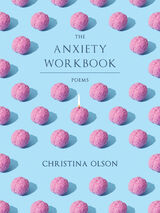
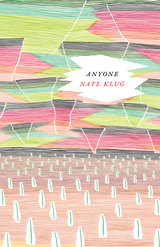
Where I-95 meets The Pike,
a ponderous thunderhead flowered—
stewed a minute, then flipped
like a flash card, tattered
edges crinkling in, linings so dark
with excessive bright
that, standing, waiting, at the overpass edge,
the onlooker couldn’t decide
until the end, or even then,
what was revealed and what had been hidden.
Using a variety of forms and achieving a range of musical effects, Nate Klug’s Anyone traces the unraveling of astonishment upon small scenes—natural and domestic, political and religious—across America’s East and Midwest. The book’s title foregrounds the anonymity it seeks through several means: first, through close observation (a concrete saw, a goshawk, a bicyclist); and, second, via translation (satires from Horace and Catullus, and excerpts from Virgil’s Aeneid). Uniquely among contemporary poetry volumes, Anyone demonstrates fluency in the paradoxes of a religious existence: “To stand sometime / outside my faith . . . or keep waiting / to be claimed in it.” Engaged with theology and the classics but never abstruse, all the while the poems remain grounded in the phenomenal, physical world of “what it is to feel: / moods, half moods, / swarming, then darting loose.”
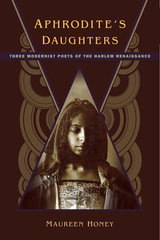
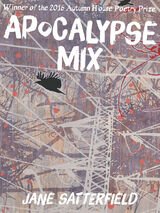
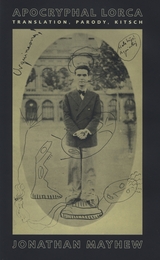
Federico García Lorca (1898–1936) had enormous impact on the generation of American poets who came of age during the cold war, from Robert Duncan and Allen Ginsberg to Robert Creeley and Jerome Rothenberg. In large numbers, these poets have not only translated his works, but written imitations, parodies, and pastiches—along with essays and critical reviews. Jonathan Mayhew’s Apocryphal Lorca is an exploration of the afterlife of this legendary Spanish writer in the poetic culture of the United States.
The book examines how Lorca in English translation has become a specifically American poet, adapted to American cultural and ideological desiderata—one that bears little resemblance to the original corpus, or even to Lorca’s Spanish legacy. As Mayhew assesses Lorca’s considerable influence on the American literary scene of the latter half of the twentieth century, he uncovers fundamental truths about contemporary poetry, the uses and abuses of translation, and Lorca himself.
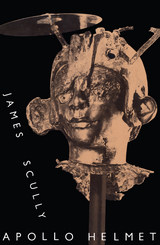
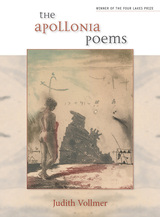
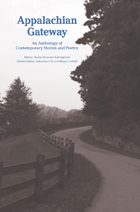
These works encompass a variety of themes that, collectively, capture the essence of Appalachia: love of the land, family ties, and the struggle to blend progress with heritage. Readers will enjoy this book not just for the innate value of good literature but also for the insights it provides into this fascinating area. This book of fiction is an enlightening companion to non-fiction overviews of the region, including the Encyclopedia of Appalachia and A Handbook to Appalachia: An Introduction to the Region, both published by the University of Tennessee Press in 2006. In fact the five sections of this book are the same as those of the Encyclopedia.
Educators and students will find this book especially appropriate for courses in creative writing, Appalachian studies and Appalachian literature. Editor George Brosi’s foreword presents an historical overview of Appalachian Literature, while Kate Egerton and Morgan Cottrell’s afterword offers a helpful guide for studying Appalachian literature in a classroom setting.
Kate Egerton is an associate professor of English at Berea College. She has taught Appalachian literature and published scholarship in that field as well as in modern drama.
Samantha Cole majored in Appalachian Studies and worked for Appalachian Heritage while a student at Berea College. Morgan Cottrell is a West Virginia native who took Kate Egerton's Appalachian literature class at Berea College.
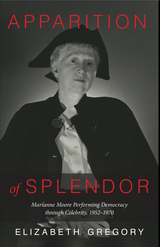
While the later work of the great Modernist poet Marianne Moore was hugely popular during her final two decades, since her death critics have condemned it as trivial. This book challenges that assessment: with fresh readings of many of the late poems and of the iconic, cross-dressing public persona Moore developed to deliver them, Apparition of Splendor demonstrates that Moore used her late-life celebrity in daring and innovative ways to activate egalitarian principles that had long animated her poetry. Dressed as George Washington in cape and tricorn and writing about accessible topics like sports, TV shows, holidays, love, activism, mortality and celebrity itself, she reached a wide cross-section of Americans, encouraging them to consider what democracy means in their daily lives, particularly around issues of gender, sexuality, racial integration, class, age, and immigration. Moore actively sought out publication in popular venues (like Vogue, The New Yorker, and the Saturday Evening Post, etc.) and wrote on material chosen to directly appeal to the audiences there, influencing younger contemporaries, including poets like Ashbery, O’Hara, and Bishop, and artists like Warhol, Yoko Ono, and Ray Johnson.
"Apparition of Splendor is brilliant and necessary. It provides an extended look at Marianne Moore’s late poetry that no other book-length study has taken on…. Gregory’s deep expertise is evident throughout. Her discussions make visible startling networks of connections between poems, and – while maintaining keen focus on the late poems – briskly but sensitively draw upon the earlier poems to clarify continuities and suggest transformations. Her archival and extra-literary research, in Moore’s papers and in regard to general cultural contexts, is wonderfully on display with every page.
The subject of Moore’s late poetry is woefully understudied, and this book will conduct an important intervention in critical tendencies to dismiss this body of work. Apparition of Splendor is a major contribution to Moore studies and to studies of 20th-century American poetry.”

When does imitation of an author morph into masquerade? Although the Roman writer Ovid died in the first century CE, many new Latin poems were ascribed to him from the sixth until the fifteenth century. Like the Appendix Vergiliana, these verses reflect different understandings of an admired Classical poet and expand his legacy throughout the Middle Ages.
The works of the “medieval Ovid” mirror the dazzling variety of their original. The Appendix Ovidiana includes narrative poetry that recounts the adventures of both real and imaginary creatures, erotic poetry that wrestles with powerful desires and sexual violence, and religious poetry that—despite the historical Ovid’s paganism—envisions the birth, death, and resurrection of Christ.
This is the first comprehensive collection and English translation of these pseudonymous medieval Latin poems.
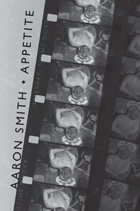
Whether he is cataloging shirtless men in films and bad television, lyricizing the anxieties of childhood, or redrawing the lines of cultural membership, Appetite attacks its subjects with wit, candor, and compassionate intensity. These poems announce their presence with a style that is as beautifully wrought as it is provocative.
In the America of Appetite, the usual hierarchies are obliterated: the disposable is as valuable as the traditional, pop culture is on the same level as the sacred, and the pleasurable simultaneity of past and present are found in high art and the tabloid. Smith’s work engages our contemporary moment and how we want to think of ourselves, while nodding to rich poetic, cultural, and personal histories.

Frank Kermode is the preeminent practitioner of the art of criticism in the English-speaking world. As such his task entails the readiness to evaluate in general terms the widest range of texts, both ancient and modern, and also the ability to make public sense of the seemingly arcane debates about theories of literature as they pertain to the ongoing process of evaluation. It has been Kermode’s distinction to make a virtue—as all the best critics have done—of the necessarily occasional nature of his profession. That virtue is evident in every page of this set of essays.
This is a book in which Kermode asks the reader to share his pleasure in the literature of a set of major writers—Milton, Eliot, Stevens. He vividly evokes Milton after the Restoration of Charles II, with a fine speculative discussion of the interplay between his personal and political circumstances and the preoccupations of his poetry. He sets before us T. S. Eliot living in a condition of permanent exile, Wallace Stevens in his old age dwelling poetically in Connecticut, and author/critic William Empson, whose singular career was marked by both the pleasure of the text and the delight in conceptual issues that characterizes so much of the contemporary taste for theory. Other essays draw our attention to debates on the literary canon and problems of biblical criticism and their implications for the study of narrative in particular and the interpretation of secular literary texts in general.
These are professional essays that nevertheless defy the excesses of modern professionalism. Nowhere is this more evident than in the polemical Prologue to the book, in which Kermode sorts out the good from the meretricious in contemporary criticism. He argues that some proclaimed theorists “seem largely to have lost interest in literature,” while the best, like Paul de Man and Jacques Derrida, have never lost what Kermode prizes most highly, the very appetite or hunger for poetry and literature. Always readable, elegant even on gnarled matters, and courteous in contexts where others are bad-tempered, An Appetite for Poetry is the work of one of the most distinguished minds of our time. In reaffirming the professional responsibilities of criticism now being neglected, it displays a generous hospitality to new ideas.
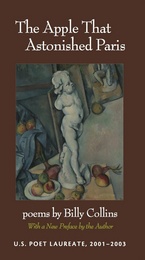
Bruce Weber in the New York Times called Billy Collins “the most popular poet in America.” He is the author of many books of poetry, including, most recently, The Rain in Portugal: Poems.
In 1988 the University of Arkansas Press published Billy Collins’s The Apple That Astonished Paris, his “first real book of poems,” as he describes it in a new, delightful preface written expressly for this new printing to help celebrate both the Press’s twenty-fifth anniversary and this book, one of the Press’s all-time best sellers. In his usual witty and dry style, Collins writes, “I gathered together what I considered my best poems and threw them in the mail.” After “what seemed like a very long time” Press director Miller Williams, a poet as well, returned the poems to him in the “familiar self-addressed, stamped envelope.” He told Collins that there was good work here but that there was work to be done before he’d have a real collection he and the Press could be proud of: “Williams’s words were more encouragement than I had ever gotten before and more than enough to inspire me to begin taking my writing more seriously than I had before.”
This collection includes some of Collins’s most anthologized poems, including “Introduction to Poetry,” “Another Reason Why I Don’t Keep a Gun in the House,” and “Advice to Writers.” Its success over the years is testament to Collins’s talent as one of our best poets, and as he writes in the preface, “this new edition . . . is a credit to the sustained vibrancy of the University of Arkansas Press and, I suspect, to the abiding spirit of its former director, my first editorial father.”

—Marina Brown, Los Angeles Review
“Every poem in April at the Ruins is a powerhouse: rich, quietly essential, profoundly lucid. Many have flavors of the best parables or folk tales, bringing us into intimate relation with mysteries and transformations abounding around and inside us…. Raab’s sense of irony is unerring. These poems prove that one of the only true forms of consolation is giving darkness its due.”
—Amy Gerstler
“[T]his collection isn’t just nostalgic. Instead, it is full of wonder. Wonder and the ability to step through wonder into a whole new place.”
—Alexis David, Compulsive Reader
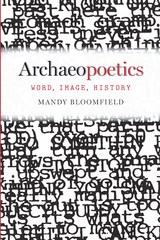
Archaeopoetics explores “archaeological poetry,” ground-breaking and experimental writing by innovative poets whose work opens up broad new avenues by which contemporary readers may approach the past, illuminating the dense web of interconnections often lost in traditional historiography.
Critic Mandy Bloomfield traces the emergence of a significant historicist orientation in recent poetry, exemplified by the work of five writers: American poet Susan Howe, Korean-American artist Theresa Hak Kyung Cha, British poet Maggie O’Sullivan, and diasporic African Caribbean writers Kamau Brathwaite and M. NourbeSe Philip. Bloomfield sets the work of these five authors within a vigorous tradition, including earlier work by Ezra Pound and Walter Benjamin, and then shows how these five poets create poems that engender new encounters with pivotal episodes in history, such as the English regicide or Korea’s traumatized twentieth century.
Exploring our shared but imperfectly understood history as well as omissions and blind spots in historiography, Bloomfield outlines the tension between the irretrievability of effaced historical evidence and the hope that poetry may reconstitute such unrecoverable histories. She posits that this tension is fertile, engendering a form of aesthetically enacted epistemological enquiry.
Fascinating and seminal, Archaeopoetics pays special attention to the sensuous materiality of texts and most especially to the visual manifestations of poetry. The poems in this volume employ the visual imagery of the word itself or incorporate imagery into the poetry to propose persuasive alternatives to narrative or discursive frameworks of historical knowledge.
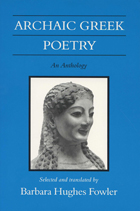
In addition to its breadth, Archaic Greek Poetry stands alone as the only volume of its kind translated by a contemporary published poet. Perhaps the most elegant translator of ancient Greek poetry into modern English, Barbara Hughes Fowler offers translations true to the original Greek while providing modern readers with superb examples of the beauty of lyric poetry. Students and scholars of classical and comparative literature, ancient history, and art history, as well as lovers of lyric poetry, will enthusiastically welcome this volume.
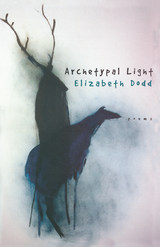


Architrenius, a satirical allegory in dactylic hexameters completed in 1184 by the Norman poet Johannes de Hauvilla, follows the journey of its eponymous protagonist, the “arch-weeper,” who stands in for an emerging class of educated professionals tempted by money and social standing. Architrenius’s quest for moral instruction leads through vivid tableaux of the vices of school, court, and church, from the House of Gluttony to the Palace of Ambition to the Mount of Presumption. Despite the allegorical nature of Architrenius, its focus is not primarily religious. Johannes de Hauvilla, who taught at an important cathedral school, probably Rouen, uses his stylistic virtuosity and the many resources of Latin poetry to condemn a secular world where wealth and preferment were all-consuming. His highly topical satire anticipates the comic visions of Jean de Meun, Boccaccio, and Chaucer.
This edition of Architrenius brings together the most authoritative Latin text with a new English translation of an important medieval poem.
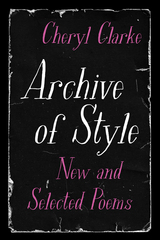
Clarke’s poetry and essays, centered around the Black, lesbian, feminist experience, have attracted an audience around the world. Her essays, “Lesbianism: an Act of Resistance” and “The Failure to Transform: Homophobia in the Black Community” revolutionized the thinking about lesbians of color and the struggle against homophobia. Her poetry and non-fiction have been reprinted in numerous anthologies and assigned in women and sexuality courses globally. Having published since 1977, Clarke and her work have become a foundational part of LGBTQ literature and activism. Archive of Style is a celebration and homage to one of American literature’s Black Women literary warriors
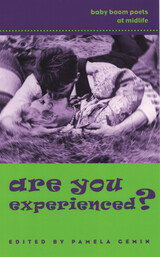
In this timely and reflective anthology, the generation that sought to stay forever young reveals that midlife should mean more than jokes about thinning hair, creaking joints, and thickening waistlines. Midlife's insights—whether they be physical, spiritual, or emotional—are indeed startling, and who better than poets to deliver them?
READERS
Browse our collection.
PUBLISHERS
See BiblioVault's publisher services.
STUDENT SERVICES
Files for college accessibility offices.
UChicago Accessibility Resources
home | accessibility | search | about | contact us
BiblioVault ® 2001 - 2024
The University of Chicago Press









